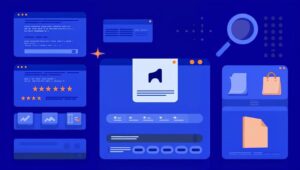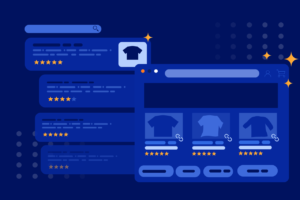Are Google Ads Worth It?
Absolutely. Google Ads are worth it because they provide a cost-effective way for businesses of all sizes to reach a virtually unlimited, targeted audience. They’re extremely flexible and you can start, stop, pause, or even adjust your bids at any time.
Wouldn’t it be great if you could push a button and customers would simply land on your web pages at the exact moment they’re looking for your product or service? Sadly, it’s not that easy. But with the right digital marketing strategies, you can certainly tip the tables in your favor.
At Break the Web, we use SEO and PPC to help our clients break through the noise of a flooded digital marketplace. Here’s why Google Ads are worth it and how they can give even the tiniest business a competitive edge.
THE 10-STEP GOOGLE SEARCH SEARCH ADS AUDIT
Download for free — Fix Your ads account!. NO SIGN-UP/EMAIL REQUIRED
How Do Google Ads Work?
Google Ads, formerly called Google AdWords, is one of the most popular pay-per-click (PPC) advertising platforms in the world.
Basically, you choose targeted keywords and bid on them, based on the amount of money you’re willing to spend per click. You choose keywords that are specific words or phrases that are often used in search queries related to your product or service.
When a user performs a search that contains your keywords, your ads will appear above organic search results on search engine results pages. This greatly increases your potential for attracting new customers based on the search terms and keywords they enter into Google search.

Search network ads also appear on Google Play, Google Maps, Google Images, and even on the Google Shopping tab.
And, with the Google Display Network, you can extend your reach with targeted display ads that your audience will see when they’re browsing their favorite websites, watching YouTube videos, using mobile ads, and even checking their Gmail.
Each time a user clicks on your ad, you are charged the amount of money you bid for that keyword (usually $1-3 but can go much higher in highly competitive niches). And, that’s the beauty of Google Ads. You only pay when someone actually clicks on your ad, so it’s easy to control your ad spend.
Here’s Why Google Ads Are Worth It
We all know that Google is the most popular and widely used search engine. With 1.2 trillion queries per year, 3.5 billion users daily, and 40,000 searches per second, it’s safe to say Google Ads offers a virtually unlimited number of opportunities for marketers looking to increase brand awareness and sales.

Google search provides an unparalleled potential audience who is actively looking for your products, services, and content. And, results are split across three networks… search, display, and video.
Let’s dive in deeper to see why Google ads are worth your time and money.
1. PPC Advertising Delivers Results Faster Than SEO
The biggest difference between SEO and PPC is the amount of time it takes to see results.
With Google Ads, you’ll see results nearly instantly. Seriously. Within minutes of your ad being approved, you could start to receive new traffic.
To get started, simply enter your carefully researched targeted keyword list, set your max bid and budget, and the traffic could start to flow that same day.
With SEO, it often takes longer to see results… sometimes several months.
While SEO is crucial for long-term sustainability, PPC is all about instant gratification.
2. Unlimited Potential
Google Ads is a scalable marketing strategy with millions of keywords to bid on and new ones added daily. That means your target audience is virtually unlimited.
Ready to boost your traffic? Add some new keywords! Created a PPC campaign that’s making you money? Increase your daily spend to bring in even more clicks.
With Google Ads, the keywords are ranked on a bidding system. When you bid higher, you can increase your position. So, if you’re in position four, increase your spend and you might jump to position two.
Money makes the world go around and the higher you rank the more traffic and clicks you’ll get. Increasing your bid allows you to attract as many potential customers as your budget allows.
3. Impressive Performance Tracking and Analytics
Google Ads software is a free tool brimming with valuable and insightful analytics built right in. It allows you to easily A/B test your ad copy and landing pages to maximize ROI- and that’s the key to any successful digital marketing campaign.
The pay-per-click stats not only tell you how your ads are performing, but also recommend what changes could be made to improve your results. They tell you everything from your average cost per click and ad position to your conversion rate… and much more.
You can see your click-through rate (CTR), cost-per-conversion (CPC), keyword search volume, ad quality score, and ad position ranking at a glance. It’s easy to see what’s working, what’s not, and adjust accordingly.
By linking your Google Ads to your Google Analytics account, you can compare PPC and organic search data side by side. All of this data can help you spend your marketing budget smarter and provide the data to back up your decisions with upper management.
4. Flexibility and Control
A Google Ads campaign can be stopped in seconds or paused and reenabled later on without penalty. This flexibility allows you to control your marketing spend better, and with no contract or fixed terms, there’s no money wasted.
5. Get a Leg Up on Your Competitors
No matter what industry you’re in, your competition is always going to be out to steal your traffic and sales using SEO and PPC. But, with Google Ads, you can outdo them by upping your bid on the right keywords.
Say your competitors are outranking you in SERPS by investing in SEO. You can raise your bid and beat them out with a smart PPC strategy.
Or, if they’re running a PPC campaign, all you have to do is outbid them to push them down in rankings.
Not only can you use paid search to cost your competition clicks and traffic, but you can also bring that traffic to your website instead. In essence, you’re stealing their traffic and redirecting to your own website.
6. Level the Playing Field
Many people assume that whoever has the largest budget wins, but that’s not always the case. Google actually prioritizes quality and relevancy when deciding which ads to display, just like they do with organic search results.
In Google’s eyes, the more relevant the ad is to the user query, the better the user experience will be. And, a user who has a good experience is more likely to keep using Google as their search engine.
Therefore, Google considers ad quality and relevancy to be just as important as your maximum bid per click. So, high-quality, optimized ads don’t have to bid as high as advertisers who create poorly done, irrelevant, low-quality ads.
Sure, certain relevant keywords will be more expensive than others (with the finance industry being notoriously expensive) but higher quality ads can lead to better ad positions and significantly lower prices- even for small business owners with a tiny marketing budget.
Here’s how it works in a nutshell:
Relevance + User Experience = Quality Score
Maximum Bid Per Click + Quality Score = Ad Rank
So, ads with the best combination of Quality Score and CPC get the best ad position.
7. Google Ads Are Available in a Wide Range of Formats
Google Adwords was originally launched back in 2000 with rudimentary, text-based ads. Although many of the original elements remain today, Google Ads now offers tons of features designed to help users compel and entice new customers.

With things like sitelinks, social proofing, location targeting, ad extensions, and shopping ads for eCommerce, the platform now offers incredible customization and control over the ad experience.
Special ad formats are available to meet the special needs of various industries, such as hotels, restaurants, and vehicle manufacturers. You can also add rich virtual elements, including interactive maps and high-resolution images.
No matter what industry you’re in there’s a good chance you’ll discover features designed to make your services and products more appealing to your target audience. And, it’s Google, so you know new features and formats are being rolled out constantly.

8. Target Potential Customers When They’re Engaged
We all know how it works. You’re in the market for a certain product or service, so you type it into Google, and it cranks out page after page of SERPs with the most relevant ads and websites for your request being on the first page. So, you click on the first result that grabs your attention and start shopping.
The biggest advantage of Google Ads is that they appear at the top of the search results page, before organic search. That means you’re reaching your target audience at a time when they’re engaged and ready to act.
Google Ads gives you complete control over your targeting options, too, from specific search terms to age, location, and even hobbies and interests.
When you choose the right keywords, bid the right amount, and create a relevant, high-quality ad you can be right in front of potential customers at the exact moment they’re in the market for your service or product.
9. Precise Targeting of Local and Niche Markets
If you have a local business with an online presence, Google Ads offers you a fantastic opportunity to reach potential customers in your local community. In fact, 72% of shoppers who perform local searches choose to visit a store within five miles of their current location. That’s no small number!
With Google Ads, you can enable location and call extensions, display your address, and include a clickable phone number. You can even enable geographical range limits to focus on your local market and avoid competing with large, national brands.
If you’re in a niche market, Google Ads also offers the advantage of being keyword specific. This allows you to pinpoint your target audience so your ad gets shown to the right people, resulting in lower ad spend and increased lead generation.
Here’s an example of how a business can use local and niche targeting to their advantage:
Let’s say your business is in Buffalo, NY, and offers snow removal services. If you bid on a broad match term, like “home services,” you would blow your ad spend quickly with very little to show for it. That’s because you would be competing with everyone who offers home services, and not just in your local area, but also across all geographies.
So, you can see how bidding on a term like “snow removal services in Buffalo” makes a lot more sense. Not only would you end up spending less money to run your ad, but you would also likely see a much higher conversion rate because your PPC ads are targeting a niche market that is specifically looking for the service you offer.
10. Easy to Control Spending
When you create a pay-per-click advertising campaign, you set key parameters that make it easy to define your spending. You decide what you’re willing to spend per click, and you’re only charged when someone clicks on your ad.
To control your spending, simply designate a daily budget. Google will use that budget to calculate your spending over a month’s time. You’ll notice fluctuations in spend each day, but at the end of the month, your overall spend will be within the budget you’ve set.
Google Ads vs Facebook Ads: What’s the Difference?
So, what’s the difference between Google Ads and Facebook paid ads? Is one better than the other? Well, it really depends on your business goals.
Some businesses choose to run both Google Ads and social media paid ads because they each offer different targeting strategies that align with the functionality of their respective platforms.
They can both raise brand awareness and visibility, drive leads and sales and help businesses get the best ROI for their ad spend.
The difference is that Facebook ads (often called paid social) help new customers find you by using criteria that target users according to their hobbies, interests, and online behaviors. It’s a great way to raise awareness for a new product that doesn’t have established search traffic.
On the other hand, Google Ads helps you find new customers using targeted keywords to bring them to your website at the exact moment they’re poised to make a purchase.

What’s the Downside of Google Ads?
Everything has a downside, and Google Ads are no exception. First and foremost, it’s not necessarily easy to learn how to find the right keywords. You could easily waste a lot of money and time while you’re learning with very little to show for it. If you don’t choose the right keywords, your ad might be seen by the wrong people… or never seen at all.
You also need to learn about negative keywords, how bidding works, how to create impactful ads and landing pages, and then be willing and able to invest the time to monitor your ads and tweak them as needed. It’s not a set it and forget it process.
And, don’t forget, once you stop spending money on Google Ads, all those new clicks go away. With SEO, it may take longer to see results, but they compound over time.
And, that’s why many companies choose to combine both strategies and work with a boutique marketing agency like Break the Web.
We’ll do keyword research to find the best opportunities in your industry. Then we’ll advise you on which keywords are better for paid ads and which ones are better for SEO, based on a deep-dive analysis of your competitors and target market.
This is our business, and our experience will save you time and money while increasing your ROI at the same time.
Let’s Recap: How to Set Yourself Up for Success with Google Ads
Going in blind is like flushing money down the drain, so you’ve got to start by doing the necessary research. Before you ever begin creating ad copy, partner with a digital marketing agency to define a budget, keywords, ad groups, and create high-quality landing pages.
Once your ads are up and running, pay attention to your Google analytics and adjust your campaign as needed. Be sure to enable conversion tracking to help you understand what’s working and what isn’t.
If you’re just learning, it’s a good idea to have a knowledgeable digital marketing agency continue to manage your ads and watch your analytics. That way, they can make adjustments as needed and ensure that your campaigns bring you maximum ROI for your time and money.
The Bottom Line: Are Google Ads Worth It?
Absolutely. Google Ads are worth it because they provide a cost-effective way for businesses of all sizes to reach a virtually unlimited, targeted audience. They’re extremely flexible and you can start, stop, pause, or even adjust your bids at any time.
The pay-per-performance pricing model is a tremendous advantage for small businesses with a tight marketing budget. And, having the ability to focus on long-tail, niche, and local keywords allows you to avoid competing with big brands that have huge advertising budgets.
Although these niche and local keywords may not receive as many clicks as broader terms, they’re much more effective for driving conversions, and that’s what really matters at the end of the day.
At Break the Web, we know that PPC campaigns must be meticulously managed and monitored. But, they’re totally worth it because they can provide amazing ROI in a short time. And, you don’t have to just take our word for it. We’ve got the case studies to prove it.
THE 10-STEP GOOGLE SEARCH SEARCH ADS AUDIT
Download for free — Fix Your ads account!. NO SIGN-UP/EMAIL REQUIRED




